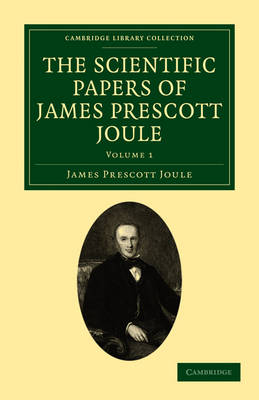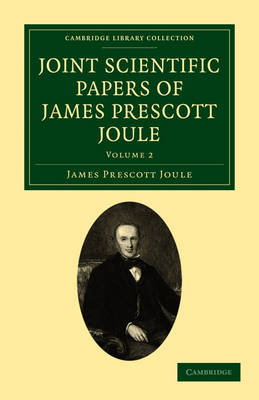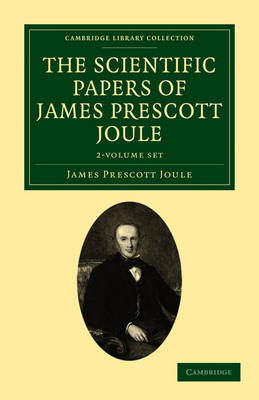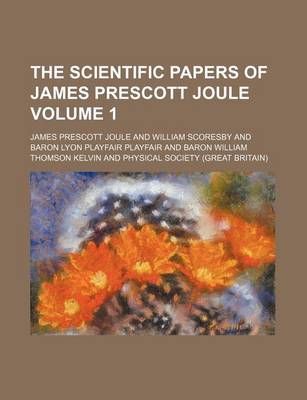Cambridge Library Collection - Physical Sciences
2 primary works • 5 total works
Volume 1
Sir James Prescott Joule (1818–1889) became one of the most significant physicists of the nineteenth century, although his original interest in science was as a hobby and for practical business purposes. The son of a brewer, he began studying heat while investigating how to increase the efficiency of electric motors. His discovery of the relationship between heat and energy contributed to the discovery of the conservation of energy and the first law of thermodynamics. Volume 1 of Joule's scientific papers was published in 1884. It is organised chronologically and reveals the range of Joule's interests and the development of his thought. The topics of the papers include the measurement of heat, voltaic batteries, electromagnets, specific heat, meteorology and thermodynamics. Joule's careful experiments in these areas were fundamental to the development of significant areas of twentieth-century physics, although he was slow to gain recognition from his contemporaries.
Volume 2
Sir James Prescott Joule (1818–1889) became one of the most significant physicists of the nineteenth century, although his original interest in science was as a hobby and for practical business purposes. The son of a brewer, he began studying heat while investigating how to increase the efficiency of electric motors. His discovery of the relationship between heat and energy contributed to the discovery of the conservation of energy and the first law of thermodynamics. Volume 2 of his collected papers, published in 1887, contains those which he co-authored with other noted physicists, such as Scoresby, Playfair and William Thomson, later Lord Kelvin. Because he was based in Manchester, and was not an academic, Joule's work was at first ignored by the scientific establishment, but Thomson's approval helped him gain acceptance. His joint work with Thomson on thermodynamics was fundamental to the development of significant areas of twentieth-century physics.
The Scientific Papers of James Prescott Joule 2 Volume Set
by James Prescott Joule
Published 31 March 2011
Sir James Prescott Joule (1818-1889) became one of the most significant physicists of the nineteenth century, although his original interest in science was as a hobby and for practical business purposes. The son of a brewer, he began studying heat while investigating how to increase the efficiency of electric motors. His discovery of the relationship between heat and energy contributed to the discovery of the conservation of energy and the first law of thermodynamics. Volume 1 of Joule's scientific papers was published in 1884. It is organised chronologically and reveals the range of Joule's interests and the development of his thought. Volume 2, published in 1887, contains papers which he co-authored with other noted physicists including Scoresby, Playfair and William Thomson, later Lord Kelvin. Joule's work, both individual and collaborative, was fundamental to the development of significant areas of twentieth-century physics.
The Scientific Papers of James Prescott Joule Volume 1
by James Prescott Joule
Published 5 March 2012
Sir James Prescott Joule (1818-1889) became one of the most significant physicists of the nineteenth century, although his original interest in science was as a hobby and for practical business purposes. The son of a brewer, he began studying heat while investigating how to increase the efficiency of electric motors. His discovery of the relationship between heat and energy contributed to the discovery of the conservation of energy and the first law of thermodynamics. Volume 1 of Joule's scientific papers was published in 1884. It is organised chronologically and reveals the range of Joule's interests and the development of his thought. The topics of the papers include the measurement of heat, voltaic batteries, electromagnets, specific heat, meteorology and thermodynamics. Joule's careful experiments in these areas were fundamental to the development of significant areas of twentieth-century physics, although he was slow to gain recognition from his contemporaries.
Joint Scientific Papers of James Prescott Joule: Volume 2
by James Prescott Joule
Published 5 August 2014
Sir James Prescott Joule (1818–1889) became one of the most significant physicists of the nineteenth century, although his original interest in science was as a hobby and for practical business purposes. The son of a brewer, he began studying heat while investigating how to increase the efficiency of electric motors. His discovery of the relationship between heat and energy contributed to the discovery of the conservation of energy and the first law of thermodynamics. Volume 2 of his collected papers, published in 1887, contains those which he co-authored with other noted physicists, such as Scoresby, Playfair and William Thomson, later Lord Kelvin. Because he was based in Manchester, and was not an academic, Joule's work was at first ignored by the scientific establishment, but Thomson's approval helped him gain acceptance. His joint work with Thomson on thermodynamics was fundamental to the development of significant areas of twentieth-century physics.




